#jewish dietary law
Explore tagged Tumblr posts
Text
Listen to me. Listen very carefully:
They are trying to wear you out.
They are trying to wear you out, and they own most major social media now, along with many major media outlets. The disinformation machine is cranking along. You are going to have to slow the fuck down and read things before you help them wear out other people, too.
So you just saw a post about a real scary bill, hunh? Republicans want to make it a capital offense to pet dogs and repeal The Sky Is Blue Act of 1793, declaring the new official color of the sky to be squant? Damn, that sounds scary.
Let's go look up this fictitious "Make The Sky Squant Again Act" on GovTracker* & on the official legislative tracker on congress.gov!
Well, let's see... GovTracker estimates it has a 1% chance of even getting out of committee and a 0% chance of being enacted, while congress.gov says this bill has 2 cosponsors who have been in the House and combined total of less than a month. The bill doesn't have any actual text, and it was referred to 5 different committees.
That fictitious bill and a hundred others like it are quite literally not worth your time, and more than that, continuing to wring your hands about it and tell other people about the scary scary squant sky bill only does their work for them. It scares people, it makes them spend time and energy on it, and it wears them out. It is a legislative Gish Gallop, meant to throw so many things at people that we can't keep up.
Even calling or messaging your Rep in this case means their staffer has to waste time responding to you and letting you know that Representative Buttzonheads definitely won't support making petting dogs a capital offense, a thing that will never, ever happen regardless.
Staying engaged in this environment is going to require protecting your heart and protecting your energy, yes, but also protecting the energy of others. This is why WWII propaganda posters also included ones taking people to task for spreading panicky rumors and undermining morale.
Do you know why most observant Jews don't eat chicken and dairy together, even though the ban is on red meat and dairy together bc you're not supposed to cook the calf in the milk of its mother?** It's not because we think that chicken might secretly lactate or Just Because. It's because the rabbis decided that if I'm sitting out in public and eating turkey and cheese together, someone might glance at the turkey and mistake it for red meat and think, "oh, well, I know that Spider is a good Jew, there must have been a change, or maybe I can just justify it to myself that if Spider does it, it must be permissible to bend the rules just that much." And I would then be accidentally leading my fellow Jew astray. We are responsible for being even more careful for the sake of others than we are for ourselves.
It's the same principle here. We need to really be careful about the information we are spreading and check things past reading a news site. Is it true? Is it relevant? Is it meaningful? Is the news site one I recognize? Can I find meaningful independent corroboration on another site, which is to say, if I find an article about it on a second site, is it just quoting or rephrasing this site?
Yeah, that is a lot. But that's how we keep them from using us to lead our fellows astray.
*GovTracker is an independent site. They explain their methodology in their About section.
**I cannot say enough how I am not at this time interested in going on a Jewish Side Quest About Dietary Laws on this post. Usually, I love it, but hold off this time, please, y'all. Let's stay on target this once.
15K notes
·
View notes
Note
Okay so maybe I'm just dumb and everyone knows what this means
But what does Kosher mean?
It's not dumb at all! Sorry anon, I'm Jewish and sometimes the cultural language from my community sneaks into my posts and I forget to explain those words. Kosher is a Jewish dietary law term, but it's more commonly used in the American vernacular to refer to something that is "okay" or "approved" or "above board."
"She checked the briefs and they're all kosher." = The briefs all look good, there's no issues or things that need to be reviewed.
"I'll pick you up around 8 if that sounds kosher?" = Does that sound good?
"I want to check the slides one last time and make sure they're all kosher." = I want to make sure the slides are all correct.
In the Jewish world, if you observe religious dietary laws, things are generally "Kosher" or "not Kosher." For instance, pork is not Kosher. This means it is generally forbidden to eat.
74 notes
·
View notes
Text

Happy Feast Day
Saint Cornelius the Centurion
1st century
Feast Day: October 20
Patronage: soldiers, benefactors, philanthropists, Jewish converts
Saint Cornelius the Centurion was the first non-Jewish convert to Christianity. He was an Italian Captain of the Roman Army. As related in the Acts of the Apostles, an angel appeared to him and invited him to seek St. Peter for instructions and baptism. At the same time, St. Peter had a vision from God that released the Jews and converts from the strict dietary Mosaic laws. After St. Peter baptized Cornelius and his family the Holy Spirit descended upon all of them.
Prints, plaques & holy cards available for purchase. (Website)
95 notes
·
View notes
Text

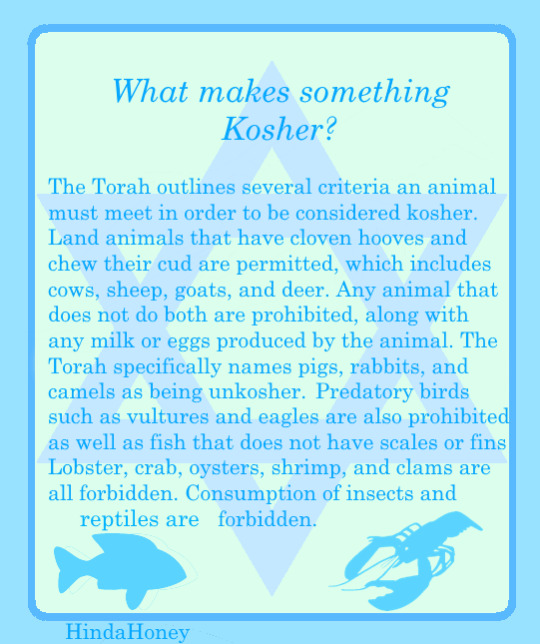


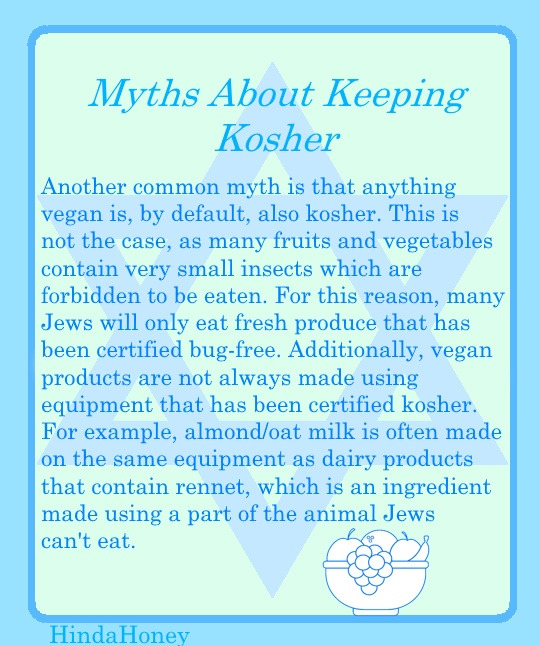









Here is a brief, non-comprehensive introduction to what "keeping kosher" means! A few things worth noting: the way people keep kosher can vary by minhag (custom), such as Sephardi Jews not eating fish with dairy, while Ashkenazi Jews will, but won't eat fish and meat on the same plate. I didn't get into kosher for Passover and the differences between minhag because it's an incredibly complicated topic, and the same applies for things like cholov yisrael, why chicken is fleishig but fish is pareve, and why some agencies are more trusted than others (Hebrew National, I'm looking at you). For a more detailed explanation, below the cut I have listed my sources. I hope you learned something new, thanks for reading!
If you liked this, you may also like my post about Shavuot and tzniut.
Sources:
The Basics of a Kosher Lifestyle
Kashrut: Jewish Dietary Laws - Judaism101
Kosher Certification, Orthodox Union
Kosher Flavors and Additives, Star-K
Orthodox Union: How To Handle Fake Kosher Symbols
WARNING: Fake Kosher Symbols Appearing on Products
#THIS TOOK FOREVER#jews#judaism#jumblr#jewish#frumblr#jewish history#jewish art#jewblr#judaica#kosher#keeping kosher#j tag#jewish stuff#jew stuff#jew tag#my post
663 notes
·
View notes
Text
"Islam was the second religion to emanate from Judaism, but as its founder was not a Jew and as it was not originally a Jewish sect, Islam's encounter with Judaism was significantly less bitter than Christianity's. As Salo Baron notes: "It was, therefore, from the beginning, a struggle between strangers, rather than an internecine strife among brethren." Largely because of this factor, Jews in the Islamic world were rarely persecuted as violently as their brethren in the Christian world. S. D. Goitein, perhaps the twentieth century's leading historian of Jewish life in the Arab world, concludes: "when the known facts are weighed, I believe it correct to say that as a whole the position of the non-Muslims [Christians and Jews under medieval Islamic rule] was far better than that of the Jews in medieval Christian Europe."
Goitein's assessment is valid, but it tells us much more about the Jews' condition under Christians than about their treatment by Muslims. For while the Jews of the Muslim world may have rarely experienced the tortures, pogroms, and expulsions that typified Jewish life under medieval Christian rule, their life under Islam was usually a life of degradation and insecurity. At the whim of a Muslim leader, a synagogue would be destroyed, Jewish orphans would be forcibly converted to Islam, or Jews would be forced to pay even more excessive taxes than usual.
Like Christianity's, Islam's anti-Judaism is deeply rooted. Islam too was born from the womb of Judaism; it too was rejected by the Jews whose validation was sought; and it too suffered an identity crisis vis-a-vis Judaism.
When Islam was born in the seventh century, there was a substantial Jewish population in Medina, where the first Muslim community arose. The Jews of pre-Islamic Arabia were active advocates of their religion, to such an extent that several kings of Himyar, now Yemen, converted to Judaism. Contemporary inscriptions described Dhu Nuwas As'ar, the last Jewish king of Himyar, as a believer in one deity whom the king called Rahman, the Merciful One, as called in Judaism and later in Islam.
During his early years, Muhammad related well to the Jews of Arabia, and their religious practices and ideas deeply influenced him. As Goitein noted: "The intrinsic values of the belief in one God, the creator of the world, the God of Justice and mercy, before whom everyone high and low bears responsibility came to Muhammad, as he never ceased to emphasized, from Israel."
The profound influence of the Jews, their Bible, and their laws on Muhammad is clearly expressed in the Koran, the Muslim bible, and in Muhammad's early religious legislation. Indeed, Muhammad saw himself as another Moses. In the Koran, he writes of his message (Sura 46, verse 12), "Before it the book of Moses was revealed....This Book confirms it. It is revealed in the Arabic tongue." Moses is a dominant figure on the Koran, in which he is mentioned over one hundred times.The Jewish doctrine that most deeply influenced Muhammad was monotheism: "There is no God but God." Muhammad's monotheism was so attuned to the uncompromising nature of Judaism's monotheism that though he had also been influenced by Christian teachers, he rejected the Christian trinity and the divinity of Jesus as not monotheistic: "Unbelievers are those that say, 'Allah is one of three.' There is but one God. If they do not desist from so saying, those of them that disbelieve shall be sternly punished" (5:71-73).
Jewish law also deeply influenced Muhammad. In the early days of Islam, Muslims prayed in the direction of the Jews' holy city, Jerusalem, and observed the most solemn Jewish holiday, Yom Kippur, the Day of Atonement. Only later, when Muhammad reluctantly concluded that the Jews would not embrace him as their prophet and convert to Islam, did he substitute Mecca for Jerusalem, and the fast of Ramadan for Yom Kippur. Similarly, Muhammad based Muslim dietary laws upon Judaism's laws of Kashrut: "You are forbidden carrion, blood, and the flesh of swine; also any flesh...of animals sacrificed to idols." The five daily prayers of Islam are likewise modeled on the three daily services of the Jews.
Second in importance only to his adoption of the Jews' God was Muhammad's adoption of the Jews' founding father, Abraham, as Islam's founder. In Sura 2, verse 125, Muhammad writes how Abraham and his son Ishmael converted the Kaaba, the holy rock of Arabian paganism, into the holy shrine of Islam.
Believing himself to be the final and greatest prophet of Mosaic monotheism, and having adopted so much of Jewish thought and practice, Muhammad appealed to the Jews of Arabia to recognize his role and to adopt Islam as the culmination of Judaism. "Even Luther," the late renowned philosopher Walter Kaufmann wrote, "expected the Jews to be converted by his version of Christianity, although he placed faith in Christ at the center of his teaching and firmly believed in the trinity. If even Luther...could expect that, how much more Muhammad, whose early revelations were so much closer to Judaism?" Muhammad's deep desire for Jewish recognition reflected the similar needs of Jesus and his followers. No group could validate Muhammad's religious claims as could the Jews, nor could any so seriously threaten to undermine them.
The Jews rejected Muhammad's claims as they had Jesus', holding in both cases that what was true in their messages was not new, and that what was new was not true. Islam may have served as a religious advance for Arabian pagans, but for the Jews it was merely another offshoot of Judaism.
One major factor that rendered Muhammad's prophetic claims untenable to Jews was his ignorance of the Bible. In large part because Muhammad never read the Bible, but only heard Bible stories, his references to the Jews' holy text were often erroneous. In Sura 28:38, for instance, he had Pharaoh (from Exodus) ask Haman (of the Book of Esther) to erect the Tower of Babel (which appears at the beginning of Genesis).
Another obstacle to Jewish acceptance of Muhammad was the moral quality of some of his teachings. They did not strike the Jews, or the Arabian Christians, as equaling, let alone superceding, the prophetic teachings of Judaism or Christianity. In 33:50, for example, Muhammad exempts himself from his own law limiting a man to four wives, and in 4:34 he instructs men to beat disobedient wives. Walter Kaufmann notes that "there is much more like this, especially in the 33rd Sura," and that "it must have struck the Jews as being a far cry from Amos and Jeremiah, and the Christians as rendering absurd the prophet's claim that he was superseding Jesus."
Finally, Muhammad's suspension of many Torah Laws invalidated him in the Jews' eyes.
For these and other reasons, the Jews rejected Muhammad's prophetic claims and refused to become Muslims. This alone infuriated Muhammad. But it was even more infuriating that the Jews publicly noted the errors in Muhammad's biblical teachings and may have even ridiculed his claims to prophecy. Goitein concludes, "it is only natural that Muhammad could not tolerate as a neighbor a large monotheistic community which categorically denied his claim as a prophet, and probably also ridiculed his inevitable blunders."
As a result Muhammad turned against the Jews and their religion, and never forgave them for not becoming his followers. And just as early Christian hostility to the Jews was canonized in the New Testament, so Muhammad's angry reactions to the Jews were recorded in the Koran. these writings gave Muslims throughout history a seemingly divinely-sanctioned antipathy to the Jews.
In the Koran, Muhammad attacked the Jews and attempted to invalidate Judaism in several ways. First, and most significantly, he changed Abraham from a Jew to a Muslim: "Abraham was neither Jew nor Christian. [He] surrendered himself to Allah....Surely the men who are nearest to Abraham are those who follow him, this Prophet" (3:67-68).
Second, he condemned the Jews and delegitimized their law by advancing a thesis similar to Paul's, that the many Torah laws had been given to the Jews as punishment for their sins: "Because of their iniquity we forbade the Jews good things which were formerly allowed them" (4:160).
Third, Muhammad charged the Jews with falsifying their Bible by deliberately omitting prophecies of his coming. For example, in the Koran (2:129), Muhammad has Abraham mouth a prophecy of his (Muhammad's) coming. Muhammad charged that the Jews "extinguish the light of Allah" (9:32) by having removed such prophecies from their Bible.
Fourth, Muhammad asserted that Jews, like Christians, were not true monotheists, a charge he substantiated by claiming that the Jews believed the prophet Ezra to be the Son of God. "And the Jews say: Ezra is the son of Allah...Allah fights against them. How perverse are they." (9:30).
These anti-Jewish fabrications, articulated by Muhammad as reactions to the Jews' rejection of him, have ever since been regarded by Muslims as God's word. Though originally directed against specific Jews of a specific time, these statements often have been understood by succeeding generations as referring to all Jews at all times, and thus form the basis of Islamic antisemitism.
One common example is 2:61: "And humiliation and wretchedness were stamped upon them and they were visited with wrath from Allah. That was because they disbelieved in Allah's revelations and slew the prophets wrongfully.j That was for their disobedience and transgression." This Koranic description of the Jews of seventh-century Arabia has often been cited by Muslims to describe Jews to this day. *
(* In a speech before his army officers on April 25, 1972, the late Egyptian President Anwar as-Sadat cited this Koranic verse, and then added: "The most splendid thing our prophet Muhammad, God's peace and blessing on him, did was to evict them [the Jews] from the entire Arabian peninsula...I pledge to you that we will celebrate on the next anniversary, God willing and on this place with God's help, not only the liberation of our land but also the defeat of the Israeli conceit and arrogance so that they must once again return to the condition decreed in our holy book: 'humiliation and wretchedness were stamped upon them'...We will not renounce this.")
Muhammad and the Koran thus laid the basis for subsequent antisemitism just as the early Christians had - and for basically the same reason: Jews remaining Jewish constituted a living refutation of Islamic beliefs. Thus, under Islam, just as under Christianity, Jew-hatred was ultimately Judaism-hatred. Any Jew who converted to Islam was accepted as an equal.
Christians under Muslim rule fared little better. Muslims and their laws generally dealt harshly with both Christians and Jews.
As long as Christian communities survived in the Muslim world, discriminatory legislation also applied to them as well. However, whereas Jewish communities often flourished as vibrant Jewish communities, Christian communities for the most part did not survive the intense Muslim hostility. Under the yoke of MUslim laws against Jews and Christians, hundreds of thousands of people in some of the oldest and strongest Christian communities in the world converted to Islam.
No fact better underscores the intensity of Muslim persecution of dhimmis (non-Muslim monotheists) than this disappearance of so many Christian communities under Islam. The fact that under similar conditions many Jewish communities flourished bears witness to the Jews' tenacious commitment to Judaism, not to Muslim benevolence toward them. This is often lost sight of when favorably comparing Muslim antisemitism with Christian antisemitism. Yet the conversion to Islam of nearly every pre-Islamic Christian community in the Muslim world (the Copts of Egypt constituting the most notable exception) eloquently testifies to what Jews had to endure in their long sojourn through the Muslim world.
The two guiding principles of Islam's treatment of Jews and Christians are that Islam dominates and is not dominated, and that Jews and Christians are to be subservient and degraded. Nonmonotheists were usually given the choice of conversion to Islam or death.
The Muslim legal code that prescribed the treatment of Jews and Christians, or dhimmis as they are both referred to in Islam, was the Pact of Umar, attributed to Muhammad's second successor, but assumed to date from about 720. Its key characteristic was the requirement that dhimmis always acknowledge their subservient position to Muslims. Jews and Christians had to pledge, for example, "We shall not manifest our religion publicly nor convert anyone to it. We shall not prevent any of our kin from entering Islam if they wish it." The subservience that dhimmis were required to show publicly to Muslims is analogous to the behavior once expected of Blacks in the Jim Crow American South: "We shall show respect...and we shall rise from our seats when they [Muslims] wish to sit." They also had to pledge "not to mount saddles," since riding a horse, or, according to some Muslims, any animal, was considered incompatible with the low status of a dhimmi. The dhimmis also had to vow "We shall not display our crosses or our books in the roads or markets of the Muslims nor shall we raise our voices when following our dead."
Anti-dhimmi legislation did not end with the Pact of Umar. In the Koran, Muhammad had urged Muslims, "Fight against such of those who have been given the Scripture...and follow not the religion of truth, until they pay the tribute readily, being brought low" (9:29). Accordingly, Muslim officials often insisted that when paying tribute, dhimmis must be "brought low," that is, humiliated.
An early Muslim regulation precisely prescribed how to humiliate Jews and Christians when they pay tribute: "The dhimmi, Christian or Jew, goes on a fixed day in person to the emir, appointed to receive the poll tax, who occupies a high throne-like seat. The dhimmi stands before him, offering the poll tax on his open palm. The emir takes it so that his hand is on top and the dhimmi's underneath. Then the emir gives him a blow on the neck, and a guard, standing upright before the emir, drives him roughly away The same procedure is followed with the second, third, and the following taxpayers. The public is admitted to enjoy this show." The public was not merely "admitted" to this humiliating spectacle, but as Baron observes, "Public participation was, indeed, essential for the purpose of demonstrating, according to the Shafi'ite school, the political superiority of Islam."
In the course of time Muslim rulers developed additional ways to humiliate dhimmis. Baron describes one of them: "Equally vexatious was the tax receipt, which in accordance with an old Babylonian custom, was sometimes stamped upon the neck of the 'unbelieving' taxpayer. This ancient mark of slavery...expressly prohibited in the Talmud under the sanction of the slave's forcible emancipation, occasionally reappeared here as a degrading stamp of 'infidelity.'"
These humiliating and painful procedures had a terrible effect on the Jews: "An Arab poet rightly spoke of entering the door with bent heads 'as if we were Jews.'"
Another law designed to humiliate dhimmis required them to wear different clothing. The purposes of this law were to enable Muslims to recognize Jews and Christians at all times, and to make them appear foolish. In 807, the Abbasid Caliph Haroun al-Raschid, legislated that Jews must wear a yellow belt and a tall conical cap. This Muslim decree provided the model for the yellow badge associated with the degradation of Jews in Christian Europe and most recently imposed by the Nazis.
A Jew living in Baghdad in the days of Al-Muqtadir (1075-96) described additional measures passed by the vizier, Abu Shuja, to humiliate Jews: "each Jew had to have a stamp of lead...hang from his neck, on which the word dhimmi was inscribed. On women he likewise imposed two distinguishing marks: the shoes worn by each woman had to be one red and one black. She also had to carry on her neck or attached to her shoe a small brass bell...And the Gentiles used to ridicule Jews, the mob and children often assaulting Jews in all the streets of Baghdad.
During the same century in Egypt, the Fatimid Caliph Hakim ordered Christians to wear a cross with arms two feet long, while Jews were ordered to wear around their necks balls weighing five pounds, to commemorate the calf's head that their ancestors had once worshiped.
These clothing regulations were not only enforced in the Middle Ages. Until their departure from Yemen in 1948, all Jews, men and women alike, were compelled to dress like beggars.
In fact, Yemen offers us a unique opportunity to understand Muslim attitudes toward the Jews. For it was the one Muslim country with a non-Muslim minority (Jews) that was never ruled by a European power. It was therefore able to treat its Jews in the "purest" Muslim manner, uninfluenced by non-Muslim domination.
In 1679, Jews in most of Yemen were expelled from their cities and villages. When allowed to come back a year later, they were not allowed to return to their homes, but were forced to settle in Jewish settlements outside of the cities. During their expulsion the synagogue of San'a, the capital, was converted into a mosque, which still exists under the name Masjid al-Jala (the Mosque of the Expulsion).
Among the many indignities to which the Jews of Yemen were constantly subjected was the throwing of stones at them by Muslim children, a practice that was religiously sanctioned. When Turkish officials (the Turks occupied Yemen in 1872) asked an assembly of Muslim leaders to see that this practice be stopped, an elderly Muslim scholar responded that throwing rocks at Jews was an Ada, an old religious custom, and thus it was unlawful to forbid it.
The greatest recurrent suffering that Yemenite Jews experienced was th e forced conversion to Islam of Jewish children whose fathers had died. This was practiced until the Jews fled Yemen in 1948, and was also based upon Islamic doctrine. Muhammad was believed to have said, "Everyone is born in a state of natural religion [Islam]. It is only his parents who make a Jew or Christian out of him." Accordingly, a person should grow up in the "natural religion" of Islam.
When a Jewish father died, there was often a "race" between Jewish communal leaders who sought to place the man's children with Jewish parents and the Muslim authorities who wanted to convert the children to Islam and place them in Muslim homes (in the Yemenite Islamic culture it would appear that the surviving mother was regarded as irrelevant). The Jews often lost. Goitein reports that "many families arrived in Israel with one or more of their children lost to them, and I have heard of some widows who have been bereaved in this way of all their offspring."
Yet as persecuted as the Yemenite Jews were, they were also denied the right to leave the country.
By the nineteenth century, the Jews' situation under Islam went from degradation to being recurrent victims of violence - as these examples from Jewish life in Egypt, Syria, and Palestine illustrate.
Egypt
In his authoritative book, An Account of the Manners and Customs of the Modern Egyyptisns, Edward Lane wrote that, at the time of his study (1833-35), the Jews were living "under a less oppressive government in Egypt than in any other country of the Turkish Empire." He added, however, that the Jews "are held in the utmost contempt and abhorrence by the Muslims in general." Lane explained: "Not long ago, they used often to be jostled in the streets of Cairo, and sometimes beaten merely for passing on the right hand of a Muslim. At present, they are less oppressed; but still they scarcely ever dare to utter a word of abuse when reviled or beaten unjustly by the meanest Arab or Turk; for many a Jew has been put to death upon a false and malicious accusation of uttering idsrespectful words against the Kuran (sic] or the Prophet. It is common to hear an Arab abuse his jaded ass, and after applying to him various opprobrious epithets, end by calling the beast a Jew.
That this was the Jewish situation in Egypt, "a less oppressive government" than elsewhere in the Muslim Arab world, tells us a great deal about Muslim antisemitism in the nineteenth century - prior to the Zionist movement.
Syria
In 1840, some French Catholics introduced the blood libel into the Arab world. After a Capuchin monk in Damascus vanished, Ratti-Mention, the local French consul, told police authorities that the Jews probably had murdered him to procure his blood for a religious ritual. Several Damascus Jews were then arrested, and under torture, oneo f them "confessed" that leaders of the Jewish community had planned the monk's murder. Many other Jews were then arrested, and under torture more such confessions were obtained. French officials pressured Syria'sruler, Muhammad Ali, to try the arrested men, and it was only after an international protest organized by Jewish communities throughout the world that the Jews who survived their tortures were released.
The blood libel immediately became popular among Muslims, who attacked Jews as drinkers of Muslim blood in Aleppo, Syria, in 1853, Damascus again, in 1848 and 1890, Cairo in 1844 and 1901-2, and Alexandria in 1870 and 1881.
The blood libel played a decisive role in unsettling the lives of nineteenth-century Syrian Jews, and since then it has been repeatedly utilized in Arab anti-Jewish writings.
Palestine
Jews have lived continuously as a community in Palestine since approximately 1200 BCE. The only independent states ever to exist in Palestine have been Jewish. After the destruction of the second Jewish state in 70 CE and the suppression of the Bar Kochba revolt in 135 CE, Jews always maintained a presence in Palestine, awaiting the reestablishment of the Jewish state. But these Jews often had to live under degrading conditions.
In nineteenth-century Palestine, which was under Ottoman Muslim rule, Jews had to walk past Muslims on their left, as the left is identified with Satan, and they always had to yield the right of way to a Muslim, by "stepping into the street and letting him pass." Failure to abide by these degrading customs often provoked a violent response.
In Palestine as elsewhere, Jews had to avoid anything that could remind Arabs of Judaism; therefore, synagogues could be located only in hidden, remote areas, and Jews could pray only in muted voices. In addition, despite the widespread poverty among Palestinian Jews, they had to pay a host of special protection taxes (in actuality, a form of extortion). For example, Jews paid one hundred pounds a year to the Muslim villagers of Siloam (just outside Jerusalem) not to disturb the graves at the Jewish cemetery on the Mount of Olives, and fifty pounds a year to the Ta'amra Arabs not to deface the Tomb of Rachel on the road to Bethlehem. They also had to pay ten pounds annually to Sheik Abu Gosh to to molest Jewish travelers on the road to Jerusalem, even though the Turkish authorities were already paying him to maintain order on that road.
These anti-Jewish laws, taxes, and practices had a rather intimidating effect on the Jews. The British consul James Finn, who lived in Jerusalem in the 1850s, described in his book Stirring Times how "Arab merchants would dump their unsold wares on their Jewish neighbors and bill them, safe in the knowledge that the Jews so feared them that they would not dare return the items or deny their purchase."
Muslim antisemitism continued to be brutally expressed through the twentieth century. Albert Memmi, the noted French-Jewish novelist, who grew up in North Africa, cites a few examples:
"In Morocco in 1907, a huge massacre of Jews took place in Casablanca, along with the usual embellishments - rape, women carried away into the mountains, hundreds of homes and shops burned, etc....In 1912 a big massacre in Fez...In Algeria in 1934, massacre in Constantine, twenty-four people killed, dozens and dozens of others seriously wounded....In Aden in 1946...over one hundred people dead and seventy-six wounded, and two-thirds of the stores sacked and burned....In June, 1941, in Iraq, six hundred people killed, one thousand seriously wounded, looting, rapes, arson, one thousand houses destroyed, six hundred stores looted....[In Libya]: November 4th and 5th, 1945, massacre in Tripoli; November 6th and 7th in Zanzour, Zaouia, Foussaber, Ziltain, etc: girls and women raped in front of their families, the stomachs of pregnant women slashed open, the infants ripped out of them, children smashed with crowbars....All this can be found in the newspapers of the time, including the local Arab papers."
Memmi summarizes the Jewish status under Islam in the twentieth century: "Roughly speaking and in the best of cases, the Jew is protected like a dog which is part of man's property, but if he raises his head or acts like a man, then he must be beaten so that he will always remember his status."
It is the Jews' refusal to accept an unequal, inferior status that lies at the heart of the Arab-Muslim hatred for Israel. (It is this, not the Palestinian refugee issue, that has been the basis of Muslim antisemitism. Without minimizing the personal difficulties of the Palestinians, as Memmi notes [on page 35 of his book Jews and Arabs]: "The Palestinian Arabs' misfortune is having been moved about thirty miles within one vast Arab nation.") As Yehoshafat Harkabi, a leading scholar of the Arab world's attitude toward Israel, put it: "The existence of the Jews was not a provocation to Islam...as long as Jews were subordinate or degraded. But a Jewish state is incompatible with the view of Jews as humiliated or wretched." The call for a Palestinian Arab state in place of Israel is for a state in which once again 'Islam dominates and is not dominated."
This hatred of Jewish nationalism was so intense that during World War II, most Arab leaders were pro-Nazi. Among them was the head of the Muslims in Palestine, the mufti Haj Amin el-Husseini (who in 1929 had helped organize the large-scale murders of the ultra-Orthodox, non-Zionist Jews of Hebron).
An ardent supporter of Hitler, the mufti spent much of the war in Nazi Germany; on November 2, 1943, at a time when the Nazis were murdering thousands of Jews daily, the mufti declared in a speech: "The overwhelming egoism which lies in the character of Jews, their unworthy belief that they are God's chosen nation and their assertion that all was created for them and that other peoples are animals...[makes them] in capable of being trusted. They cannot mix with any other nation but live as parasites among the nations, suck out their blood, embezzle their property, corrupt their morals....The divine anger and curse that the Holy Koran mentions with reference to the Jews is because of this unique character of the Jews."
Though many Arab nations formally declared war against Germany in 1945, when German defeat was imminent, in order to be eligible for entry into the United Nations, extensive Arab sympathy with the Nazis continued even after Germany's surrender. The Egyptians and Syrians long welcomed Nazis to their countries, offering them the opportunity to further implement the "Final Solution," by assisting in their efforts to destroy Israel and wipe out the Jewish community living there.
Among many Arabs the Holocaust has come to be regarded with nostalgia. On August 17, 1956, the French newspaper Le Mongde quoted the government-controlled Damascus daily Al-Manar as observing, "One should not forget that, in contrast to Europe, Hitler occupied an honored place in the Arab world....[Journalists} are mistaken if they think that by calling Nasser Hitler, they are hurting us. On the contrary, his name makes us proud. Long live Hitler, the Nazi who struck at the heart of our enemies. Long live the Hitler [i.e., Nasser] of the Arab world."
On June 9, 1960, after Israeli agents captured Adolf Eichmann, the Nazi official who had supervised the murder of six million Jews, the Beirut daily Al-Anwar carried a cartoon depicting Eichmann speaking with Israeli Prime Minister David Ben-Gurion. Said Ben-Gurion: "You deserve the death penalty because you killed six million Jews." Responded Eichmann: "There are many who say I deserve the death penalty because I didn't manage to kill the rest."
On April 24, 1961, the Jordanian English-language daily Jerusalem Times published an "Open Letter to Eichmann," which concluded, "But be brave, Eichmann, find solace in the fact that this trial will one day culminate in the liquidation of the remaining six million to avenge your blood." At the UN sponsored "Conference Against Racism" in September 2001, an Arab pamphlet displayed at the Durban Exhibition Center featured a picture of Adolf Hitler with the caption, "If I had won the war there would be no...Palestinian blood lost."
Arab Jew-hatred also has brought about the resurrection of the blood libel. In 1962, the Egyptian Ministry of Education reissued Talmudic Sacrifices by Habib Faris, a book originally published in Cairo in 1890. The editor notes in his introduction that the book constitutes "an explicit documentation of indictment, based upon clear-cut evidence that the Jewish people permitted the shedding of blood as a religious duty enjoined in the Talmud."
On April 24, 1970, Fatah radio, under the leadership of Yasir Arafat, broadcast, "Reports from the captured homeland tell that the Zionist enemy has begun to kidnap small children from the streets. Afterwards the occupying forces take the blood of the children and throw away their empty bodies. The inhabitants of Gaza have seen this with their own eyes."
Even more disturbing, the blood libel accusations have been made by the most prominent figures within the Arab world. In November 1973, the late King Faisal of Saudi Arabia said that it was necessary to understand the Jewish religious obligation to obtain non-Jewish blood in order to comprehend the crimes of Zionism. A decade later, in 1984, the Saudi Arabian delegate to the UN Human Rights Commission Conference on religious tolerance, Marouf al-Dawalibi, told the commission, "The Talmud says that if a Jew does not drink every year the blood of a non-Jewish man, he will be damned for eternity." In The Matzah of Zion, a book that has remained in print since its publication in 1983, Mustafa Tlas, the Syrian Defense Minister since 1972, wrote, "The Jew can kill you and take your blood in order to make his Zionist bread." A 2000 article about Tlas's book in Al-Ahram, Egypt's largest, and government-controlled, newspaper, reported, "The Bestial drive to knead Passover matzahs with the blood of non-Jews is [confirmed] in the records of the Palestinian police where there are many recorded cases of the bodies of Arab children who had disappeared without being found, torn to pieces, without a single drop of blood. The most reasonable explanation is that the blood was taken to be used in matzahs to be devoured during Passover." As one American journalist commented: "If this is 'the most reasonable explanation," can you imagine an unreasonable one?" The Al-Ahram article went on to report that an Egyptian movie company is planning to shoot a multimillion dollar film version of The Matzah of Zion, which will retell, as truth, the story of the Damascus blood libel.
And still the blood libel goes on. A 2001 cartoon in the Jordanian newspaper Al-Dustour depicts an Israeli soldier presenting his mother with a Mother's Day gift of a bottle containing the blood of a Palestinian child. At about the same time (November 2001), Abu Dhabi Television depicted a caricature of Israeli Prime Minister Ariel Sharon preparing to drink a cup of blood taken from a Palestinian. A March 10, 2002, article in Saudi Arabia's Al-Riyadh, the government-controlled newspaper, by Dr. Umayma Ahmad Al-Jalahma of King Faisal University, creates a new twist to this ancient libel, claiming that Jews use blood for Purim pastry and not just for Passover matzo: "Let us now examine how the victims' blood is spilled. For this, a needle-studded barrel is used; this is a kind of barrel, about the size of the human body, with extremely sharp needles set in it on all sides. [These needles] pierce the victim's body, from the moment he is placed in the barrel. These needles do the job, and the victim's blood drips from him very slowly. Thus, the victim suffers dreadful torment - torment that affords the Jewish vampires great delight as they carefully monitor every detail of the blood-shedding with pleasure and love that are difficult to comprehend."
Arab Muslims have also reached back to classical themes of Islamic antisemitism to attack the Jews and Israel. Many Arab speakers and publications echo Muhammad's charge in the Koran (5:82) that the Jews are the greatest enemies of humankind. For example, an Egyptian textbook, published in 1966 for use in teachers' seminars, taught that Jews (not only Israelis) are the "monsters of mankind [and] a nation of beasts."
Perhaps the favorite antisemitic publication in the Arab world for over fifty years has been The Protocols of the Elders of Zion.. In an interview with the editor of the Indian magazine Blitz, on October 4, 1958, President Gamal Abdel Nasser of Egypt praised the Protocols: "I wonder if you have read a book called 'Protocols of the Learned Elders of Zion.' It is very important that you should read it. I will give you an English copy. It proves clearly, to quote from the Protocols, that 'three hundred Zionists, each of whom knows all the others, govern the fate of the European continents and they elect their successors from their entourage."
The late King Faisal of Saudi Arabia gave copies of the Protocols to the guests of his regime. When he presented the Protocols, along with an anthology of antisemitic writings, to French journalists who accompanied French Foreign Minister Michel Jobert on his visit to Saudi Arabia in January 1974, "Saudi officials noted that these were the king's favorite books."
Article 32 of the 1988 Palestinian Hamas (the Islamic Resistance Movement) Covenant claims that the Zionist "scheme" foe takeover of the Arab world "has been laid out in The Protocols of the Elders of Zion, and their present [conduct] is the best proof of what is said there." Hamas literature repeatedly accuses Jews of controlling the world's wealth and its most important media, and using them to promote Jewish and Zionist interests, even of having established the League of Nations in the 1920s "in order to rule the world."
Al-Hayat Al-Jadida, the official newspaper of the Palestinian Authority (and therefore supposedly less extreme than Hamas), regularly contains references to the Protocols. Thus, even during the height of the Oslo peace process the paper published the following: "It is important to conduct the conflict according to the foundations which both are leaning on...particularly the Jews...such as the Torah, the Talmud, and the Protocols...This conflict resembles the conflict between men and Satan." At about the same time in Egypt, Al-Ahram, the country's largest newspaper, reported, "A compilation of the investigative' work of four reporters on Jewish control of the world states that Jews have become the political decision-makers and control the media in most capitals of the world (Washington, Paris, London, Berlin, Athens, Ankara)." As the journalist Andrew Sullivan comments, "It is worth noting that every word Al Ahram prints is vetted and approved by the Egyptian government, a regime to which the United States - i.e., you and I - contributed $2 billion a year."
It is perhaps no surprise that, as of 2002, over sixty editions of the Protocols are being sold throughout the Arab world, and this libelous "warrant for genocide" is probably more widely distributed today than at any other time in its history. In 2002, the New York Times, in a front-page story, reported that a major Egyptian television station was about to launch a forty-one-episode TV series based on the Protocols (complete with Jewish villains dressed in black hats, side curls, and beards) to run before and during the Muslim holy month of Ramadan.
The Islamic world today has combined antisemitic motifs from Nazism and medieval Christendom, as well as from its own tradition. This potent combination has made the Arabs the major source of antisemitic publications in the world today. And as in other forms of antisemitism, in the words of Yehoshafat Harkabi, "the evil in the Jews is ascribed not to race or blood, but to their spiritual character and religion." Thus, when Pakistani Islamic terrorists kidnapped Wall Street Journal reporter Daniel Pearl in January 2002, they forced Pearl to say, "I am a Jew," (and videotaped him doing so) before slitting his throat.
Only through an understanding of the deep theological roots of Muslim antisemitism and an awareness of its continuous history can present-day Muslim hatred of Israel be understood. Only then does one recognize how false are the claims of Israel's enemies that prior to Zionism, Jews and Muslims lived in harmony and that neither Islam nor Muslims have ever harbored Jew-hatred. The creation of the Jewish state in no way created Muslim Jew-hatred; it merely intensified it and gave it a new focus.
So long as the Jews acknowledged their inferior status among Muslims, they were humiliated but allowed to exist. But once the Jews decided to reject their inferior status, to become sovereign after centuries of servitude, and worst of all, to now govern some Muslims in a land where the Jews had so long been governed, their existence was no longer tolerable. Hence the passionate Arab Muslim hatred of Israel and Zionism, a hatred that entirely transcends political antagonisms. Hence the widespread Muslim call not merely for a military defeat of Israel, but for its annihilation.
As so often in Jewish history, it is the Jewish nation's existence that arouses hatred and needs to be ended. Despite peace treaties between Israel and Egypt (1979) and Jordan (1994), for most Muslims the source of their hatred remains the Jewish sate's existence, not its policies, nor even its borders.
The Muslim and Arab claim that the issue is anti-Zionism rather than antisemitism really means that so long as the Jews adhere to their dhimmi status in Arab Muslim nations, their existence as individuals is acceptable. But for a Jew to aspire to equality among Muslims, for a Jew to aspire to a status higher than "humiliation and wretchedness," is to aspire too high."
- Why the Jews? The Reason for Antisemitism, Dennis Prager and Joseph Telushkin, chapter nine
#joseph telushkin#rabbit joseph telushkin#dennis prager#antisemitism#history#jewish history#jumblr#why the jews the reason for antisemitism
58 notes
·
View notes
Text
Names in Severance
Studies show that first names tend to be particular to individuals, whereas surnames are tied to the family.
- The You You Are, Dr. Ricken Lazlo Hale, PhD
I went on a deep dive on researching name meanings on Severance, as I'm sure many others have. For those of you not insane enough to do this, my findings are below the cut.
Spoilers up to and including episode four of season two.
Why am I doing this? Well, names play a massive role in this show.
Gabby chooses the name William for her baby but Gabrielle names him Declan, which clues Devon in to something being up with her. The first chapter of The You You Are is about names, and after Ricken's reading Rebeck says she'll have to change her name again.
But most notably: the innies have no last names of their own and don't know the first names of their superiors. This divide is a huge aspect of the power dynamics of the severed floor and seemingly the rest of Lumon, as Cobel is referred to casually as Harmony by Natalie and other superiors but only ever as Ms. Cobel by the MDR department. Helena knowing Milchick's first name and casually calling him by it is what finally confirms Irving's suspicions, and he immediately weaponizes it against him. "Yes, do it, SETH."
I'm listing the full known name at the top (except for repeats like last names being the same) and then the meaning of each name in a subsequent line. So for example "Ricken Lazlo Hale" gets three lines: the first one for Ricken, then Lazlo, then Hale. If it's in the same line it's a different possible meaning for the same name. My own notes are in brackets.
MDR
Mark Scout of Mars (the god) - warlike, indicator, sign someone who goes ahead to gather information about enemies
Peter Kilmer stone kiln worker, famous sacrifice
Helly R. / Helena Eagan torch (Helen of Troy's kidnapping started the Trojan War) little fire
Irving Bailiff green water, river Irvine law enforcement officer
Dylan George toward the tide (going with the flow?) farmer, earthworker
ADMIN
Judd a river, descending, flowing down (the river where Jesus was baptized by John)
Harmony Cobel / Selvig agreement, calm, music (harmonizing two different tones) fishing boat bay of seals (nordic place name, I thought this was meaningless until episode four and now I'm like ???)
Seth Milchick appointed, placed (the third son of adam and eve sent to heal the family after cain killed abel) a jewish dietary law forbidding "boiling a (goat) kid in its mother's milk" (this has got to be on purpose, but what does it mean??)
Natalie Kalen christmas day, birth of the lord slender, fair, blessed, pure, keeper of keys
Ms. Casey watchful, vigilant (this one really convinces me some of these names are chosen with great care)
Doug Graner dark river manager, german place name
Ms. Huang phoenix (literally coming back to life in a blaze of fire)
MARK'S LIFE
Gemma gem, precious stone, "a small cellular body or bud that can separate to form a new organism"
Devon cattle, divine, poet
Ricken Lazlo Hale powerful, wealthy ruler healthy
Eleanor shining light
Patton Thune nobleman money
Rebeck Gulk instrument, tie, snare friend/servant (sometimes: of Christ)
Danise devoted to bacchus / dionysus
Alexa defender of man
THE EAGANS
Kier (CEO 1865-1939) a vat where fabrics are boiled/bleached/dyed
Imogene maiden, innocent
Ambrose (CEO 1939-1941) immortal
Myrtle (CEO 1941-1959) evergreen shrub (evergreen = never dies)
Baird (CEO 1959-1976) poet
Gerhardt (CEO 1976-1987) hard spear
Phillip "Pip" (CEO 1987-1999) friend of horses seed, excellent
Leonora (CEO 1999-2003) light
Jame (CEO 2003-) follower, supplanter, protector
Helena torch
OTHERS
O&D
Burt Goodman fortified town good man
Felicia lucky, successful
DYLAN'S FAMILY
Gretchen pearl
Jim protected/protector
Merrick fame, power, ruler of the sea, dark
Ruth friend, pity, compassion
PETEY'S FAMILY
June young
Nina little girl / shortened form of any name ending in -nina
THE ARTETAS
Angelo Arteta angel evergreen oak
Gabrielle / Gabby woman of god / talkative
Bradley (NOT William) broad meadow (NOT will helmet / desire to protect)
Declan good man / man of prayer
Kai keeper of keys, the sea, king
MISC.
Asal Reghabi honey again stupid? (ghabi = stupid)
Cecil Fields (Burt's partner) blind / sixth pasture
Charlotte (Cobel, name on breathing tube) free
—
And what does all this mean? WELL, some themes I'm picking up on are the water, fire and earth, as well as light and living forever. It's of interest to me that both Gemma and Peter refer to a sort of stone, which is a plus for Mark/Petey shippers. There's a lot of water imagery connected with Lumon, but Eagan means fire. Then there's Huang meaning phoenix, which is rebirth through fire. I'm not sure how to take this yet but it's percolating.
The double meaning of Gemma is also really giving some big clone energy, I'm sorry to say. I know the makers of the show have stated that there's not a clone thing going on, but there's something happening here. I hope Ms. Huang isn't her clone, mostly because they're wildly different looking people whose only real commonality is being asian women.
I've also been looking into alchemy and the Philosopher's Stone as it relates to the themes of Severance, and all of this really rhymes with a lot of that. (I might make a seperate post about it tbh.)
Kilmer meaning kiln worker also really fucks with me, what with the water/fire/earth thing. You need water to mold clay, but firing it in a kiln turns it solid. In the Perpetuity Wing Irving tells Helly: "It’s an unnatural state for a person to have no history. History makes us someone. Gives us a context. A shape. But waking up on that table, I was shapeless." And Mark was a professor of history, and Casey made him sculpt his feelings out of clay, and he sculpted the tree that Gemma hit with her car, which neither of them remember... there's something here, I think.
I think Ricken and his friends, especially Patton, are descended from old money and may even be distantly related to the Eagans.
And then there's Reghabi, which doesn't seem to exist as a name/word outside of this show, but "ghabi" literally only returns results about the Urdu word meaning "idiot". I might be way off base but it makes me worried Reghabi isn't trustworthy. It's giving "the surest way to tame a prisoner is to let him believe he's free".
28 notes
·
View notes
Photo

Christian Antisemitism in the Middle Ages & during the Reformation
Antisemitism is a modern term that describes prejudice and hostility to Jews and Judaism. The origins of Christian antisemitism in the gospels are based on the story of a 1st-century itinerant Jewish preacher, Jesus of Nazareth, in the Roman province of Judea.
The gospels explained the trial and crucifixion of Jesus of Nazareth and claimed that he died because of religious differences with the Jewish leadership, and not as a traitor to the Roman Empire. Early Christians claimed that Jesus Christ and his followers were persecuted by Jews, which was the justification for the persecution and murder of Jews by Christians in the Middle Ages and beyond. Racial and behavioral theory became an added element in the early modern era.
Early Christianity
When the first Christian missionaries took the teachings of Jesus Christ to the cities of the Eastern Roman Empire, more Gentiles (non-Jews, pagans) wanted to join than Jews. Debates arose as to whether these new believers (Gentile Christians) had to fully convert to the ritual requirements of Jewish identity, such as circumcision and Jewish dietary laws. Some of the Jewish Christians continued to insist on their conversion. In Paul's letters and the Acts of the Apostles, we have extensive apologia, explanations of why Gentile Christians did not have to become Jews first. Many of the arguments compared the new movement against Judaism, introducing innovations such as 'faith', and the sacrificial atonement of Jesus' death. These writings set the parameters for the separation of Christianity from Judaism.
In the 2nd century, continuing resistance to the new movement by Jews led Christian bishops to create adversos literature ("writings against the Jews as adversaries"). Utilizing the polemic of the gospels and the letters of Paul the Apostle, they claimed that just as the Jews 'persecuted' Jesus and his disciples, they continued to persecute Christians in their contemporary culture. These treatises, however, provided no contemporary evidence for the specific ways in which Jews 'persecuted Christians' in cities in everyday life outside of debate. Beginning in Late Antiquity to the Middle Ages and beyond, these writings continued to be used as rationalization for the persecution and murder of Jews.
Continue reading...
34 notes
·
View notes
Text
Being a secular Jew in places where there aren't a lot of Jews to begin with.
This has been on my mind a lot these past few months. I am originally from the Philly area, which has a large Jewish population, and grew up surrounded by secular and religious Jews. However, in pursuing my career I've moved across the USA and lived in the South East, the Midwest, the Great Plains, and the Central Southern region. In all of these areas I have been the only Jew my new social circle has met, and on every occasion they have this perceived stereotype of what a Jew is that is contradictory and they don't even know it. I've stated before that I grew up in the Reconstructionist movement, but in all honesty I have always been a secular Jew and neither myself nor my family practiced Halaka (even my Conservative grandparents didn't, nor did my great-grandparents). Part of this is due to the culture in the north east, the pseudo-assimilation, and the integration of Jewish culture with many other cultures. I grew up eating cheesesteaks and hoagies from Jewish delis. I worked in a deli that sold kosher products on one side and cured pork products on the other. Bagel sandwiches with bacon? Absolutely. Were there people who kept kosher in my community and social circle? Of course, but they got a steak sandwich instead of a cheesesteak and we thought nothing of it. But moving out of the area? Hoo boy. I would eat bacon and goyim would absolutely freak out on me. "Aren't you Jewish?! YOU CAN'T EAT BACON!". Not realizing that there were Jews who didn't abide by those rules. They would then tell me all about Judaism from the TV they watched and/or other media they consumed, and it'd always have a scene of secular New York Jews eating pepperoni pizza. They literally had an example right there in front of them and they didn't understand. I remember even bringing it up to a friend and they went "wait, pepperoni is made from pork?" That alone made me take psychic damage. So this is for my goys out there who seem to think every Jew keeps dietary laws and restrictions. We don't. We have nothing against those that do either. We're all one big tribe with a lot of variety in it. But we do all have IBS and are lactose intolerant.
42 notes
·
View notes
Text
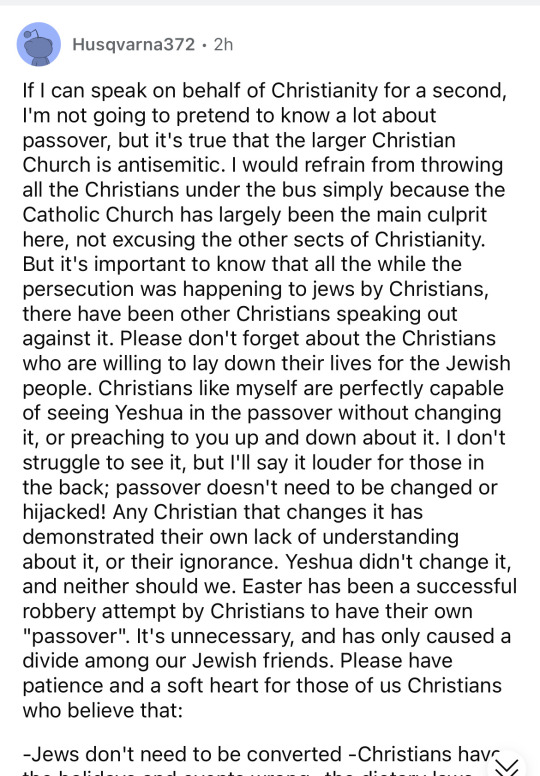
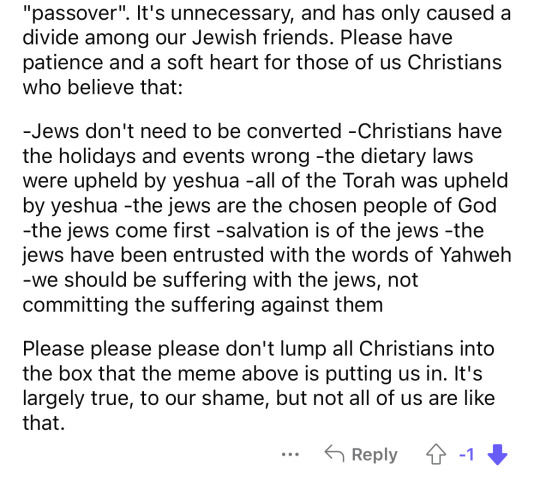
Here’s an interesting one-is this antisemitism? I think so. Let’s discuss:
First, the context. This comment was left on a post containing this meme, poking fun at the messianic “Jews” (they aren’t Jewish) and antisemitic Christians that appropriate Pesach.

Now. This person does make a few correct statements, and I’ll give them credit. They’re right that a lot of Christians and Christianity are antisemitic. But with that out of the way, let’s look at the myriad of ways they’re so very wrong:
I'm not going to pretend to know a lot about Passover
User admits that they are not qualified to be making judgements. As a Christian it isn't their place to tone police Jews anyways, but especially since they admit that they have no idea what they're talking about.
I would refrain from throwing all Christians under the bus
I'm sure they would. That isn't what is happening though, and framing it like this highlights their defensiveness- they aren't trying to have a productive conversation, they just don't like seeing Christianity being portrayed this way. Playing the victim, and not for the last time.
The Catholic church has largely been the main culprit here
Interestingly, there is a Catholic elsewhere in the thread blaming the Protestants. Typical Protestant vs. Catholic stuff, and this user is using it to attempt to distance themself from the "bad" Christians. Also, in my experience, almost every Christian "seder" I've seen or heard of has been held by a Protestant sect of some sort.
it's important to know that all the while the persecution was happening to jews by christians, there have been other christians speaking out against it.
More of the same, see above. "not all Christians!"
Please don't forget about the Christians who are willing to lay down their lives for the Jewish people.
Here's where the fetishization starts. Also, literally nobody asked you to do that, don't use us to feed your martyr complex. Also also, where exactly are these Christians, because they've been doing a shitty job.
Christians like myself are perfectly capable of seeing Yeshua in the Passover without changing it, or preaching to you up and down about it.
And this is where the explicit antisemitism starts, as opposed to the red flags we've been seeing. This person, based on their language, seems to be some sort of "Torah believing Christian"- something inherently appropriative and antisemitic.
Furthermore, YOU SHOULD NOT BE SEEING JESUS IN PASSOVER. That is, at best, idiotic, and at worst, actively antisemitic. It's certainly supercessionist. JEWISH TEXTS DO NOT PROPHESIZE JESUS. Christians should not be touching Pesach uninvited in ANY way, regardless of if they change things or not.
Yeshua didn't change it and neither should we
This person demonstrates an astounding level of ignorance. Any modern Seder would HAVE to be different than any Seder Jesus might have held (assuming he even existed), because it is impossible to do it like him. There is no temple to offer animal sacrifices at, like there would have been at the time. Regardless, not only should Christians not be changing seders, they shouldn't be touching it.
They then rant for a while about how Easter is bad. Which. My dude. That's your holiday. Go fuck around with that and leave Jews alone.
Please have patience and a soft heart for Christians who believe that:
More "not all Christians", this time with an added level of playing the victim. Hard pass.
-Jews don't need to be converted
Even stopped clocks are right twice a day.
-Christians have the holidays and events wrong
Uh? No? Is this some weird Christian intracommunity thing? Your holidays are your holidays, leave ours alone.
-the dietary laws were upheld by yeshua
Regardless of if this is true or not, Jesus was Jewish. This poster isn't. Kosher is for Jews. Christians aren't entitled to Jewish practice just because they worship a Jew.
-all of the torah was upheld by yeshua
see previous bullet point.
-the Jews are the chosen people of God
Typical Christian misunderstanding of "Chosen". "Chosen" to uphold the mitzvot, not to be better, or put on a pedestal. This is another example of how they fetishize Jews, and it does not get better.
-the Jews come first
See previous bullet point. Fetishization like this is disgusting and harmful. It removes humanity and personhood from Jews, instead presenting us as some mystical object of worship that we never claimed to be and can never live up to. We are not a zoo exhibit, we are a vibrant and living culture.
-salvation is of the Jews
See previous bullet point. We are people, not a tool for your salvation.
-the Jews have been entrusted with the words of Yah*weh
See previous bullet point. Also super disrespectful to just throw that name around in Jewish spaces, but I don't know what I expected from an antisemitic, philosemitic Jew fetishist.
-we should be suffering with the Jews, not against them
WE ARE NOT FUEL FOR YOUR MARTYR COMPLEX. Plenty of Jewish suffering would be alleviated if Christians like this person would just leave us alone. But they don't actually want Jewish suffering to stop, because then they'd lose a tool and a way to play victim.
they end with a plea not to lump all Christians together with the "bad" ones- something literally nobody was doing. Once again, it's a lot of "Not all Christians!!!" and their own self-victimhood. They say not all Christians are "like that", which is true. But this one certainly is.
Chag Pesach sameach everybody, and stay off the fuss bus.
#antisemitism#christian antisemitism#cultural appropriation#passover#reddit#messianic judaism#<they aren't jews btw#philosemitism#long post#religious antisemitism
263 notes
·
View notes
Text


All Abrahamic religions claim to be monotheistic, worshiping an exclusive God, although one who is known by different names. Each of these religions preaches that God creates, is one, rules, reveals, loves, judges, punishes, and forgives.
However, although Christianity does not profess to believe in three gods—but rather in three persons, or hypostases, united in one essence—the Trinitarian doctrine, a fundamental of faith for the vast majority of Christian denominations, conflicts with Jewish and Muslim concepts of monotheism.
Since the conception of a divine Trinity is not amenable to tawhid, the Islamic doctrine of monotheism, Islam regards Christianity as variously polytheistic.

Judaism and Islam have strict dietary laws, with permitted food known as kosher in Judaism, and halal in Islam. These two religions prohibit the consumption of pork; Islam prohibits the consumption of alcoholic beverages of any kind. Halal restrictions can be seen as a modification of the kashrut dietary laws, so many kosher foods are considered halal; especially in the case of meat, which Islam prescribes must be slaughtered in the name of God. Hence, in many places, Muslims used to consume kosher food. However, some foods not considered kosher are considered halal in Islam.

With rare exceptions, Christians do not consider the Old Testament's strict food laws as relevant for today's church; see also Biblical law in Christianity. Most Protestants have no set food laws, but there are minority exceptions

The Seventh-day Adventist Church (SDA) embraces numerous Old Testament rules and regulations such as tithing, Sabbath observance, and Jewish food laws. Therefore, they do not eat pork, shellfish, or other foods considered unclean under the Old Covenant. The "Fundamental Beliefs" of the SDA state that their members "are to adopt the most healthful diet possible and abstain from the unclean foods identified in the Scriptures".

Proselytism
Judaism accepts converts, but has had no explicit missionaries since the end of the Second Temple era.
Judaism states that non-Jews can achieve righteousness by following Noahide Laws, a set of moral imperatives that, according to the Talmud, were given by God[k] as a binding set of laws for the "children of Noah"—that is, all of humanity. It is believed that as much as ten percent of the Roman Empire followed Judaism either as fully ritually obligated Jews or the simpler rituals required of non-Jewish members of that faith.

Christianity encourages evangelism. Many Christian organizations, especially Protestant churches, send missionaries to non-Christian communities throughout the world. See also Great Commission. Forced conversions to Catholicism have been alleged at various points throughout history. The most prominently cited allegations are the conversions of the pagans after Constantine; of Muslims, Jews and Eastern Orthodox during the Crusades; of Jews and Muslims during the time of the Spanish Inquisition, where they were offered the choice of exile, conversion or death; and of the Aztecs by Hernán Cortés. Forced conversions to Protestantism may have occurred as well, notably during the Reformation, especially in England and Ireland
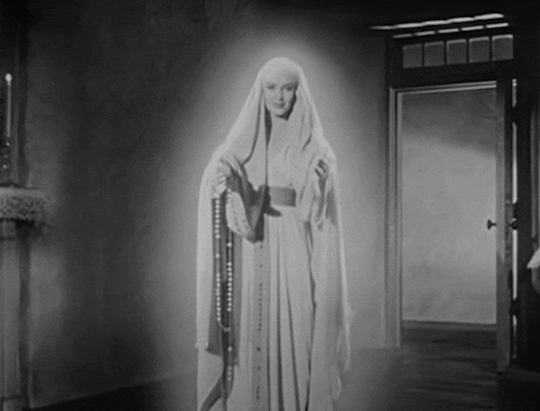
#kemetic dreams#islam#jews#judaism#talmud#christians#christmas#christianity#jesus christ#christian broadcasting network
56 notes
·
View notes
Note
I don't think you were ever asked this before. Could a Jewish person eat at a halal restaurant, and a Muslim at a kosher restaurant?
Kashrut is completely different from Muslim dietary laws, because of the various prohibitions in Kashrut that is not considered prohibited within Islamic law, such as mixing meat with dairy. Not only that, but for someone to perform the ritual slaughter (schechita) you require a schochet, while in the case of Islamic ritual slaughter (Zabitha), any Muslim can perform the slaughter. With that said, I don't think Halal food is considered Kosher to Jewish people.
As for Muslims, any food from the people of the Book is permissible as long as it has undergone a ritual slaughter and provided the butchers are ritually pure. In most cases, any slaughtered food from Christians are considered impermissible, since majority of them do not follow a dietary law. Jewish people have a much stricter rule regarding Kashrut, thus any food considered Kosher is Halal by majority of scholars. According to most Shi'a scholars, it is permissible to eat from the food provided by the People of the Book with the exception of meat.
130 notes
·
View notes
Text


Top: Still Life with Herrings. 1962.
Ludwig Meidner painted numerous still lifes after his return to Germany. Again and again he painted the ingredients of his meals: vegetables, fowl and fish. Although he had move to a village north of Frankfurt, where he was the only Jew, Meidner strictly observed the Jewish dietary laws.
Bottom: Praise the Lord, My Soul 1936/1937
This still life is an exception among Meidner’s religious images, which consist primarily of drawings and mostly portray human figures. However, it is illuminating insofar as it underscores the main theme of Meidner’s religious art. The tallit (prayer shawl), the tefillin (phylacteries on the right and in the open velvet pouch) and the prayer book (a Siddur for the weekdays or a Machzor for the high holy days) illustrate the central importance of prayer for devout Jews
Via Jewish Museum Frankfurt
9 notes
·
View notes
Note
I think a lot of religious rules were made by people who had OCD, and ironically now those religious rules made by people with OCD now cause a type of OCD (Religious OCD) where your OCD is focused on if you're following religious rules "correctly"
Thoughts on this or am I insane? 😔
on one hand i see what u mean but at least from what i know a lot of religious rules r, at their core, v logical when looking at the society, region n era that produced them. like religious laws regarding maintaining premarital virginity for women n loyalty to a husband were an easy way for a misogynist society to control women, as well as, considering how much less effective premodern forms of birth control were, ensuring that that societys men were providing for n raising children that were in fact biologically theirs. for example the jewish law that requires a minyan (10 "adult" men, as in 13+, after their bar mitzvah - bar mitzvah is lit. 'capable of mitzvah') for many prayers n rituals ensures that jewish ppl do not live alone but rather in communities, which is one of the ways jewish communities have maintained themselves. a lot of dietary laws may seem "weird" or "illogical" to us in the modern era or from a different region, but a lot of them have internal logic as well. like afaik one of the reasoning for pork being forbidden in judaism n islam is bc its v difficult to sustainably raise pigs in the middle east n in fact raising too many pigs would damage the ecosystem. ive also heard that its dangerous bc of the heat + climate (?) but idk how true/scientific that is lmfao n im too tired to check. but yeah a lot of these laws r v logical n make a lot of sense when looking at their cultural n geographical context, but def make a lot of problems for ppl w ocd (myself included)
16 notes
·
View notes
Text
It’s remarkable how just a handful of ingredients — celery, onion, carrots, mushrooms, barley and water — can truly transform into something hearty and nourishing. This isn’t unlike other Jewish foods, like cholent or chicken soup; Jews are masterful at transforming the ingredients on-hand into dishes that feed bellies and souls.
I am sure you have heard of mushroom barley soup, maybe enjoyed a bowl at your local deli or diner, or perhaps your grandmother made it from scratch. But did you know that mushroom-barley soup, or krupnik, is even more Jewish than matzah ball soup?
As Joel Haber explains in this piece, krupnik is a simple and hearty Polish soup made from barley and various root vegetables. Eastern European Jews had a strong affinity for mushrooms, since they were rich, nutritious and, best of all, they grew abundantly in local wooded areas, making them free.
Making this soup without meat also allows it to be pareve, so it can be eaten with either dairy or meat meals according to kosher dietary laws. While non-Jews may have made a vegetarian version if they couldn’t afford meat, most Polish recipes stress the importance of both meat and bones to create the proper consistency, making the vegetarian version distinctly Jewish.
This soup is ideal for so many things: a comforting meal train meal, paired with crusty bread and a salad; easy to make as a big batch to enjoy all week for lunch; or when you want to hear your kids complain “I don’t like mushrooms,” and then eat the barley and carrots all around those carefully sautéed mushrooms.
Notes:
Anyone who has watched “Julie & Julia” knows you don’t want to crowd your pan when cooking mushrooms. I cook this quantity of mushrooms in three batches to allow them enough space to caramelize slightly on each side.
I chose to make this recipe with a combination of white mushrooms and baby bella mushrooms. You can absolutely mix different types of mushrooms based on your taste (or what you have on hand), as long as the total quantity is around 1 lb.
If you want to turn the mushroom flavor up even more, you could add some rehydrated porcini mushrooms as you sauté the mushrooms. You can also add some of the hydrating mushroom liquid into the both for extra umami.
To make this soup pareve (non-dairy), just omit the butter.
This soup keeps well in the fridge for 3-5 days and can be frozen; you may just need to add some additional water or broth when reheating.
45 notes
·
View notes
Text

Saint Cornelius the Centurion
1st century
Feast Day: October 20
Patronage: soldiers, benefactors, philanthropists, Jewish converts
Saint Cornelius the Centurion was the first non-Jewish convert to Christianity. He was an Italian Captain of the Roman Army. As related in the Acts of the Apostles, an angel appeared to him and invited him to seek St. Peter for instructions and baptism. At the same time, St. Peter had a vision from God that released the Jews and converts from the strict dietary Mosaic laws. After St. Peter baptized Cornelius and his family the Holy Spirit descended upon all of them.
Prints, plaques & holy cards available for purchase here: (website)
56 notes
·
View notes